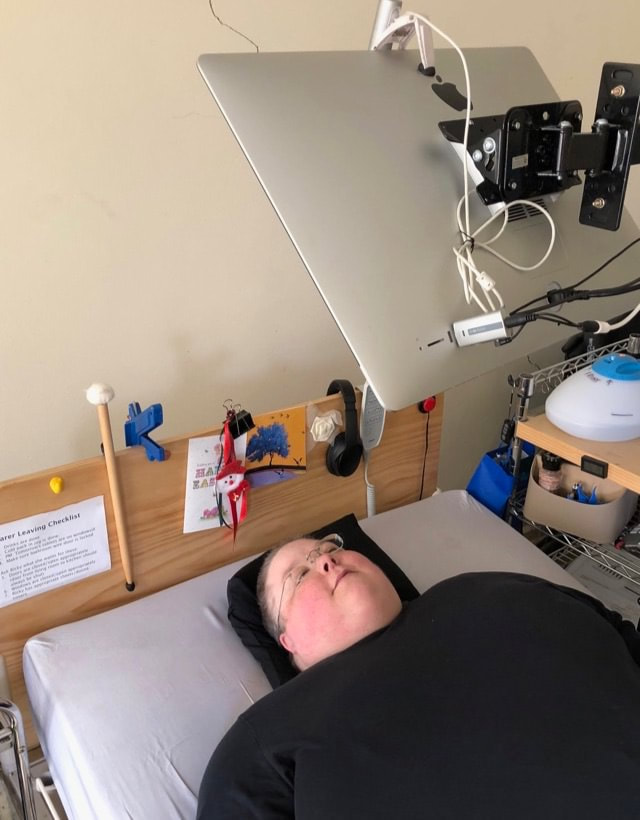|
One thing I've noticed since I wrote the Just Invisible report is that there are a few things that people suggest over and over, so I've started a FAQ page to address them.
If you've come directly to this page, you should go back and read the Just Invisible Report first. "You shouldn't say 'bedridden' or 'homebound', they're too negative" (or words to that effect)I am quite frequently told that "bedridden" and "homebound" are not appropriate words to use. One disability activist told me that I should use the phrase "people unable to access supports needed to leave their beds", even though the problem is my disability itself, not my lack of supports.
I understand where the problem comes from - people have learned that “wheelchair bound” is not appropriate language because it’s inaccurate and also implies wheelchairs are awful when actually they are fantastic freedom machines. That’s true and it’s great but don’t let it pour over to making you feel afraid of phrases like “homebound” and “bedridden”. There are two important reasons: firstly, there’s nothing enabling or freeing about being stuck at home or stuck in bed, the way a wheelchair can be enabling and freeing. Secondly, and most importantly, “homebound” and “bedridden” (or some folk prefer “housebound” or “bedbound”) – these are the ONLY words we have to describe our situation. You don’t get to take away the only words people have to describe themselves ever in any situation. You especially don’t take those words away when we are already a tiny minority within a minority who are mostly erased by society anyway. Health Care Homes will fix the problem
It has been suggested to me by several politicians that the Health Care Homes program currently being trialled around Australia would solve problems for homebound/bedridden patients who can't attend their GP's surgeries.
Health Care Homes bills itself as "a general practice or ACCHS that coordinates care for patients with chronic and complex conditions" which certainly sounds like it should cater to homebound/bedridden patients, but unfortunately the way it's set up it doesn't. Health Care Homes gives the GP surgery a certain amount of money for each patient and lets the GP surgery decide how to spend that money - so they could in theory choose to spend it helping homebound/bedridden patients. The biggest problem is that Health Care Homes don't give the GP more money for looking after a homebound/bedridden patient that any other patient, so there's no incentive for practices to accept bedridden patients. I phoned the four Heatlh Care Homes trial sites nearest to my house and none of them were accepting new bedriden patients. This is standard for GP practices - nobody will accept bedridden patients because we take a lot of resources to look after and the Medicare rebates are insufficient to cover that. Health Care Homes offers GP flexibility about how they spend the bucket of money but they still don't offer practices any more for treating a homebound/bedridden patient, even though we still take more resources. Unless Health Care Homes offers practices extra money for looking after homebound/bedridden patients, GP practices have no reason to start accepting us at patients. Why don't you just use a GP After Hours service?After-Hours GP Services are often suggested to homebound/bedridden patients as a service which will solve all our problems... after all, everybody knows they're doctors who literally come to your home, what could be more perfect? Unfortunately, the reality is that these services offer little if any help to homebound/bedridden patients.
The biggest problem with after-hours GP services is that they do not provide most of the services that a chronically ill patient needs from a GP. After-hours services are great for a middle-of-the-night antibiotic script when you need it, but they won't write repeats scripts for your regular medications. They won't prescribe you new regular medications such as antidepressants or painkillers. They won't write referrals if you need to see a specialist, or reports for Centrelink or NDIS or similar. They don't provide prentative services such as flu shots or pap smears. In addition, because of the way after-hours GP services are set up, they don't provide any continuity of care - you'll rarely see the same doctor twice. And of course, they only come after hours and there are frequently many-hour waits, so they can disturb much-needed sleep for a homebound/bedridden patients. It would be really great if after-hours GP services really did provide general practitioner services, but they would more accurately be described an after-hours emergent care service designed to keep people out of emergency rooms, and that's not what a chronically ill patient needs. |


